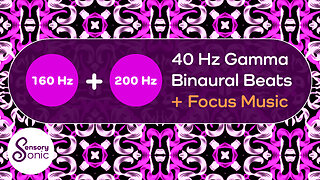Premium Only Content

222 Hz Isochronic Tones With Atmospheric Relaxation Music | 30 Minutes Of Healing Sounds
This relaxing yet uplifting video combines continuous 222 Hz isochronic tones with atmospheric music with a gentle beat. At 30 minutes, it's perfect for a longer meditation or as background music for when you want to concentrate.
#isochronic #isochronictones #222 # 222hz #brainwaveentrainment #meditation #meditationmusic #isochronicbeats #relaxation #relaxationmusic #relax #soundhealing #soundhealingmeditation #solfeggio #solfeggiofrequencies #angelnumbers #angel #healing #concentration
---
Isochronic tones are a form of brainwave entrainment that involves rhythmic audio pulses. These tones consist of evenly spaced, distinct sound pulses that synchronize the brainwaves to a specific frequency. When you listen to isochronic tones, your brainwave activity tends to align with the frequency of the tones.
The working principle behind isochronic tones is based on the brain's natural tendency to synchronize with external rhythmic stimuli. This phenomenon, known as brainwave entrainment, can influence your mental state and potentially induce various effects.
Benefits of Isochronic Tones:
Relaxation: Isochronic tones can help promote relaxation and reduce stress levels. Listening to these tones may trigger the production of calming brainwave patterns, such as alpha and theta waves, which are associated with a relaxed state of mind.
Focus and Concentration: Isochronic tones in the beta frequency range (around 14-30 Hz) can enhance focus and concentration. These tones stimulate the brain to produce beta waves associated with alertness and cognitive functioning.
Meditation and Mindfulness: Many individuals use isochronic tones during meditation or mindfulness practices. The tones can help guide the mind into a deeper meditative state by promoting the production of theta and delta brainwaves associated with increased introspection and a sense of tranquillity.
Sleep Improvement: Isochronic tones in the delta frequency range (around 0.5-4 Hz) are often used to promote deep sleep and combat insomnia. These tones encourage the brain to generate delta waves associated with deep relaxation and restorative sleep.
Side Effects and Considerations:
Sensitivity: Some individuals may be more sensitive to isochronic tones than others. Start with lower volume levels and gradually increase if desired. If you experience any discomfort or adverse effects, discontinue use.
Potential Disruption: Isochronic tones may not suit everyone in all situations. Avoid listening to them while operating machinery or engaging in tasks that require your full attention. They are best used in a controlled environment where you can relax and focus without distraction.
Individual Variations: The response to isochronic tones can vary from person to person. Some individuals may experience the desired effects immediately, while others may require regular and consistent use over time to notice changes. Results can also depend on individual brainwave patterns, state of mind, and personal receptiveness.
Lack of Scientific Consensus: While there is anecdotal evidence and some studies exploring the potential benefits of brainwave entrainment, the scientific community does not universally endorse or validate the efficacy of isochronic tones. More research is needed to establish their effectiveness and understand their mechanisms fully.
It's always advisable to consult a healthcare professional or expert in brainwave entrainment before incorporating isochronic tones into your routine, especially if you have any underlying medical conditions or concerns.
-
 29:59
29:59
Sensory Sonic
1 year ago40 Hz Gamma Binaural Beats With Hypnotic Focus Music | Ideal For Study & Work Productivity
1.26K -
 LIVE
LIVE
Dr Disrespect
11 hours ago🔴LIVE - DR DISRESPECT - PUBG - 5 CHICKEN DINNERS CHALLENGE
3,762 watching -
 LIVE
LIVE
I_Came_With_Fire_Podcast
10 hours agoSHALL NOT BE INFRINGED| THE TYRANNY OF UNELECTED BUREAUCRATS | XI BOWS
151 watching -
 LIVE
LIVE
SynthTrax & DJ Cheezus Livestreams
12 hours agoFriday Night Synthwave 80s 90s Electronica and more DJ MIX Livestream THE GREAT EDO WARS OF 2067 Edition
326 watching -
 LIVE
LIVE
RalliedLIVE
2 hours ago $0.45 earnedWarzone Domination w/ Ral
172 watching -
 1:10:17
1:10:17
Sarah Westall
4 hours agoWorld Leaders Increasingly Display Panic Behavior as Economic Change Accelerates w/ Andy Schectman
34.5K5 -
 LIVE
LIVE
Motherland Casino
1 hour agoScar x Ayanna
64 watching -
 41:57
41:57
BonginoReport
6 hours agoProtecting Kids From WOKE Ideology in School (Ep. 35) - Nightly Scroll with Hayley Caronia -04/25/25
77.6K24 -
 LIVE
LIVE
SpartakusLIVE
4 hours agoFriday Night HYPE w/ #1 All-American Solo NUKE Hero
139 watching -
 LIVE
LIVE
crystalkittn
31 minutes agohappy friday lets get littt✨ !motherland
25 watching